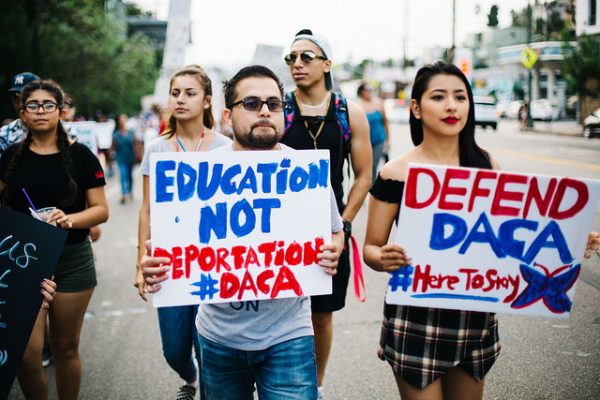
The Trump administration recently discontinued an Obama administration policy known as Deferred Action for Childhood Arrivals (DACA). Established in 2012, DACA provided steps toward permanent residency for undocumented immigrants who have lived in the United States since childhood. Conditions include proof of living in the United States since before age 16, criminal background checks, status as employed or a college-student, and routine renewal and payment every two years. Furthermore, DACA recipients are ineligible for federal welfare, student aid, and citizenship. Public figures, including pundit Ann Coulter and Attorney General Jeff Sessions, have expressed concerns about immigrants taking too many jobs, draining social support programs, and threatening American culture and ways of life. Research shows, however, that these individuals are not a threat to American culture and society — they are in fact a part of American culture and society.
Many DACA recipients are deeply enmeshed in American society, as virtually all have lived in the United States since childhood. Since the DREAM act was originally passed, beneficiaries have experienced better mental and physical health outcomes. Furthermore, the legislation has offered people in precarious positions a way to be better incorporated into their society; nearly all are employed, speak English as a first language, and have family ties to the United States. Rescinding these protections, therefore, could possibly lead to adverse impacts on recipients’ well-being and lifestyle.
- Donald Kerwin and Robert Warren. “Potential Beneficiaries of the Obama Administration’s Executive Action Programs Deeply Embedded in US Society.” Journal of Migrant Health and Security 4(1): 16-28.
- Roberto G. Gonzales, Veronica Terriquez, and Stephen P. Ruszczyk. 2014. “Becoming DACAmented: Assessing the Short-Term Benefits of Deferred Action for Childhood Arrivals (DACA).” American Behavioral Scientist 58(14): 1852-1872.
- Rachel Siemons, Marissa Raymond-Flesh, Colette L. Auerswald and Claire D. Brindis. 2017. “Coming of Age on the Margins: Mental Health and Wellbeing Among Latino Immigrant Young Adults Eligible for Deferred Action for Childhood Arrivals (DACA).” Journal of Immigrant and Minority Health 19(3):543-551.
The Trump administration has left Congress time to either renew or repeal DACA. Even if DACA is continued, however, research has shown that state and municipal governments vary greatly in the support they provide to undocumented immigrants. So, even if DACA survives at the federal level (which is not at a guarantee), variations in state and local governments could lead to vastly different outcomes for people in different regions across the country.
- Kara Cebulko and Alexis Silver. 2016. “Navigating DACA in Hospitable and Hostile States State Responses and Access to Membership in the Wake of Deferred Action for Childhood Arrivals.” American Behavioral Scientist 60(13): 1553-1574.
- Tom K. Wong and Angela S. García. 2016. “Does Where I Live Affect Whether I Apply? The Contextual Determinants of Applying for Deferred Action for Childhood Arrivals.” International Migration Review 50(3):699–727.

Comments